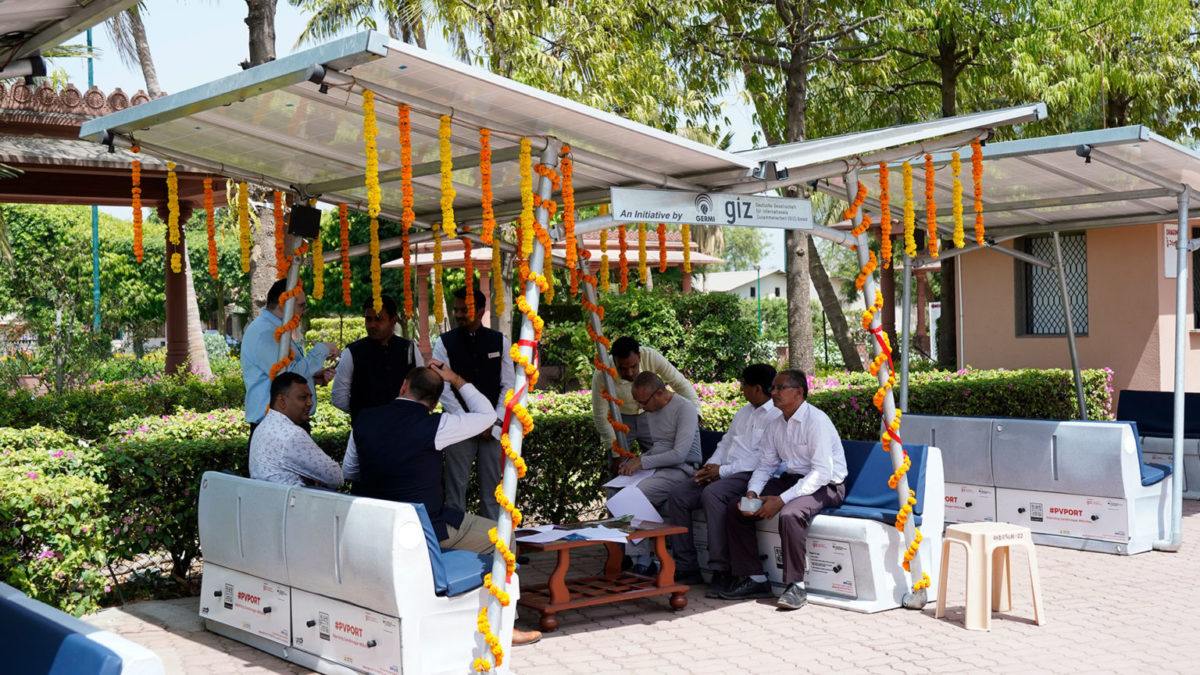From pv magazine India
Gujarat’s Swaminarayan Akshardham temple now has 10 portable solar rooftop systems complementing its existing 200 kWp solar system to replace conventional polluting fuels effectively.
Called PV Ports, the systems at the temple complex in the Gandhinagar district were installed under the Ministry of New and Renewable Energy’s initiative to develop renewable energy in cities across India.
PV Ports are standard plug-and-play photovoltaic systems with a minimum of 2 kWp, designed by German development agency Deutsche Gesellschaft für Internationale Zusammenarbeit (GIZ). These come with or without battery storage.
Unlike conventional rooftop solar systems, the PV Port systems can be easily installed by a single person without the need of rewiring and civil work, and allow the space below the panels to be utilized. The systems are highly cost-effective, require low maintenance, and have a long shelf life of 25 to 30 years. These are designed for 100% self-consumption and no power is fed into the grid. Each system leads to an average annual savings of INR 24,000 ($314) on electricity bills.
Popular content
The PV Ports were manufactured by New Delhi-based Servotech Power Systems Limited (SPSL), a leading manufacturer of high-end solar products, LEDs, oxygen concentrators, and EV charging equipment, under the Make in India initiative.
“Solar energy has to play an important role in reducing the country’s dependence on conventional sources of electricity,” said Raman Bhatia, SPSL's founder and managing director. “The unique PV Port system is the way ahead for greater adoption of solar power in the country. We are thankful to GIZ and the Ministry of New and Renewable Energy for this opportunity to contribute to ushering in a renewable transformation.”
The PV Port systems were inaugurated in the presence of Shwetal Shah, an advisor with Gujarat's Climate Change Department and officials from the Gujarat Energy Research & Management Institute (GERMI) and the Swaminarayan Akshardham temple.
“Such collaboration and the resulting synergies are expected to benefit consumers to a huge extent,” said Joerg Gaebler, principal advisor at GIZ. “We are very optimistic that the partnerships will provide us insights to deal with emerging challenges and capitalize on city-level opportunities, which will help us replicate the results in other cities across India.”
This content is protected by copyright and may not be reused. If you want to cooperate with us and would like to reuse some of our content, please contact: editors@pv-magazine.com.



2 comments
By submitting this form you agree to pv magazine using your data for the purposes of publishing your comment.
Your personal data will only be disclosed or otherwise transmitted to third parties for the purposes of spam filtering or if this is necessary for technical maintenance of the website. Any other transfer to third parties will not take place unless this is justified on the basis of applicable data protection regulations or if pv magazine is legally obliged to do so.
You may revoke this consent at any time with effect for the future, in which case your personal data will be deleted immediately. Otherwise, your data will be deleted if pv magazine has processed your request or the purpose of data storage is fulfilled.
Further information on data privacy can be found in our Data Protection Policy.